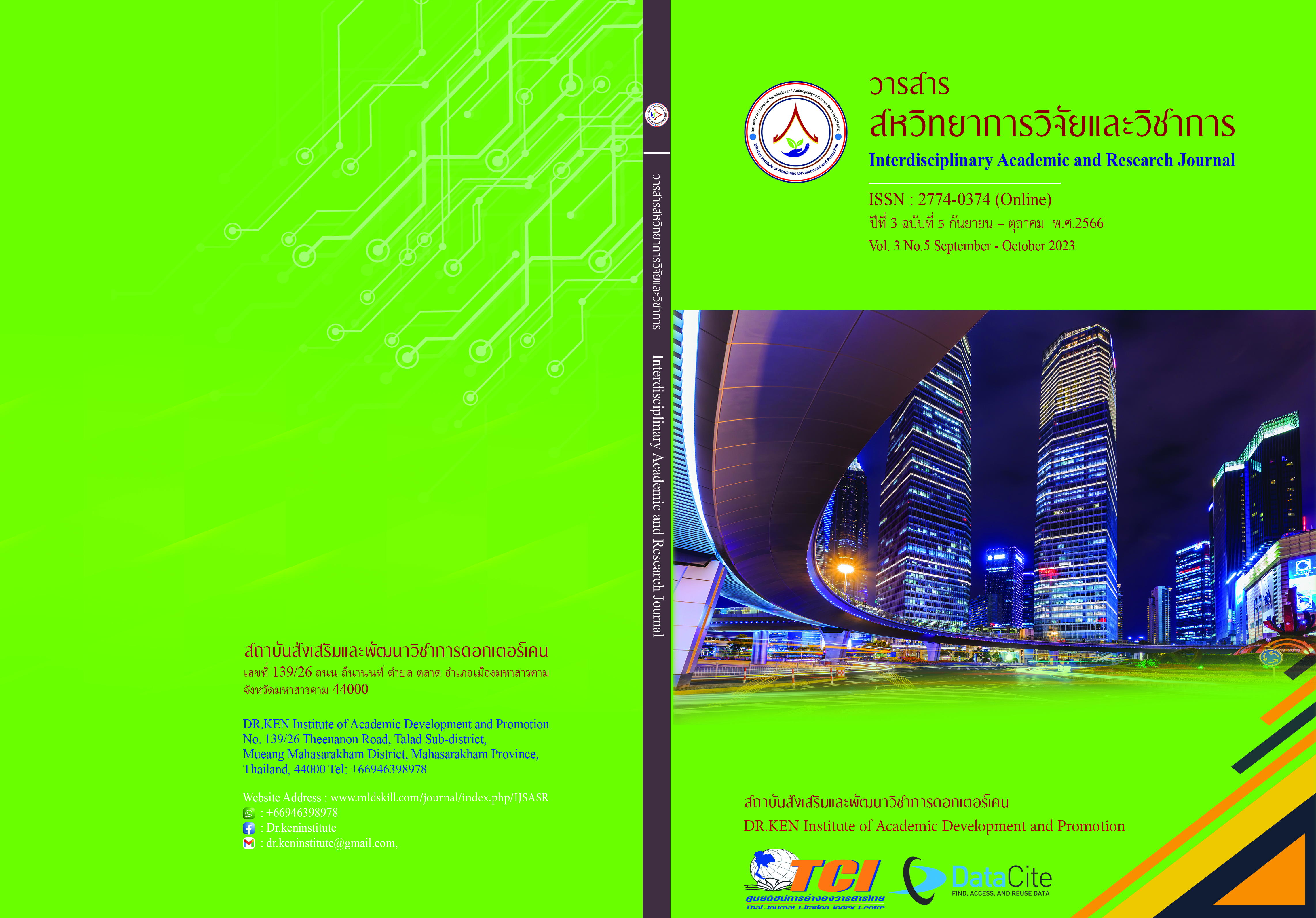The Development of Caregivers in Providing Experiences to Develop the Intelligence Quotient (IQ) of Early Childhood Children in the Early Childhood Development Centers under Local Administrative Organizations in Chaiyaphum Province
DOI:
https://doi.org/10.14456/iarj.2023.280Keywords:
Caregivers; , Intelligence; , Childhood Development Center; , Early ChildhoodAbstract
The decline in early childhood intelligence is mainly due to parents' lack of knowledge and understanding on how to properly raise children and lack of opportunities to learn how to be good parents, which, if parents are involved in school, will help improve their children's academic performance. Many local government organizations have important missions in early childhood education management in child development centers. Thus, the purposes of this research were to explore the teaching and learning management and the needs of the Early Childhood Development Centers under Local Administrative Organizations in Chaiyaphum Province and to develop the caregivers in organizing experiences to develop the intelligence quotient (IQ) of early childhood children in the Early Childhood Development Centers under Local Administrative Organizations in Chaiyaphum Province. The samples were divided into 2 phases. Phase 1: Twenty samples, including the heads of the Early Childhood Development Centers, the caregivers, the parents, and those involved in early childhood education under Local Administrative Organizations in Chaiyaphum Province were recruited by a purposive sampling method. Phase 2: Fifty caregivers from five Early Childhood Development Centers under Local Administrative Organizations in Chaiyaphum Province were selected by a multi-stage random sampling method. The results were as follows. (1) The teaching and learning management and the needs of the Early Childhood Development Centers: In terms of personnel, the personnel are not enough, and they do not have an early childhood education degree. The budgets for supporting the Early Childhood Development Centers are also limited. The buildings of the Early Childhood Development Centers do not meet the standards. The parents want their children to be able to read and write. Regarding the needs of the Early Childhood Development Centers under Local Administrative Organizations in Chaiyaphum Province, a survey on the needs and necessities should be conducted. In terms of the budgets, cooperation with the community should be built to purchase materials and equipment as well as improve the buildings to meet the standards. Community participation should be promoted. The development guidelines for the caregivers taking care of the children in the Early Childhood Development Centers under Local Administrative Organizations should focus on the use of local wisdom and participatory action research. (2) The results of the development of the caregivers in organizing experiences to develop the IQ of early childhood children in the Early Childhood Development Centers: The caregivers have developed their knowledge and understanding. They can make use of localization to create an integrated plan to develop the intelligence quotient (IQ) of early childhood.
References
กชกร แสนทาโจ. (2565). การศึกษาสภาพการดำเนินงานตามมาตรฐานสถานพัฒนาเด็กปฐมวัยแห่งชาติของศูนย์พัฒนาเด็กเล็กในสังกัดองค์กรปกครอง ส่วนท้องถิ่น อำเภอฝาง จังหวัดเชียงใหม่. ปริญญาการศึกษามหาบัณฑิต สาขาวิชาการบริหารการศึกษา. มหาวิทยาลัยพะเยา.
กรมการปกครอง, 2542. การจัดตั้งหน่วยงานปกครองส่วนท้องถิ่น. กรุงเทพฯ: กรมการปกครอง
กรมการพัฒนาชุมชน. (2542). อ.บ.ต. กับการพัฒนาสิทธิเด็ก. พิมพ์ครั้งที่ 2. กรุงเทพฯ: ยูไนเต็ดโปรดั๊กชั่น
กระทรวงศึกษาธิการ. (2546). คู่มือหลักสูตรการศึกษาปฐมวัย พุทธศักราช 2546 (สำหรับเด็กอายุ 3 – 5 ปี). กรุงเทพฯ: โรงพิมพ์คุรุสภาลาดพร้าว.
กระทรวงศึกษาธิการ. (2562). มาตรฐานสถานพัฒนาเด็กปฐมวัยแห่งชาติ (พิมพ์ครั งที่ 1). กรุงเทพฯ: โรงพิมพ์กระทรวงศึกษาธิการ.
กระทรวงศึกษาธิการ. (2563). ประกาศกระทรวงศึกษาธิการ เรื่อง นโยบายและแนวปฏิบัติในการจัดการศึกษาและการเรียนรู้สาหรับเด็กปฐมวัย. Retrieved on 5 November 2020, from: http://academic.obec.go.th/images/official/1600765436_d_1.pdf
กาญจนา ไชยพันธ์. (2544). การทดสอบทางจิตวิทยา. ขอนแก่น: ภาควิชาจิตวิทยาการศึกษา คณะศึกษาศาสตร์. มหาวิทยาลัยข่อนแก่น, 2544.
ขวัญฟ้า รังสิยานนท์. (2562) การพัฒนารูปแบบการเสริมสร้างทักษะสมอง-อีเอฟ สำหรับเด็กปฐมวัย โดยใช้กระบวนการมีส่วนร่วม ในโรงเรียนเครือข่าย มหาวิทยาลัยสวนดุสิต. กรุงเทพฯ: มหาวิทยาลัยสวนดุสิต.
คณะกรรมการพัฒนาเด็กปฐมวัยแห่งชาติ. (2562). เอกสารประกอบการประชุมชี้แจงแนวทางการดำเนินงานตามมาตรฐานสถานพัฒนาเด็กปฐมวัยแห่งชาติ.
ไตรเทพ ประสานชาติ. (2564). แนวทางการพัฒนาการดําเนินงานศูนย์พัฒนาเด็กเล็ก สังกัดองค์กรปกครอง ส่วนท้องถิ่น จังหวัดชัยภูมิ. ภาคนิพนธ์ หลักสูตรรัฐประศาสนศาสตรมหาบัณฑิต สาขาวิชารัฐประศาสนศาสตร์ มหาวิทยาลัยราชภัฏนครราชสีมา.
ทัศนีย์ นาคุณทรงและคณะ. (2551). การพัฒนารูปแบบการเรียนการสอนศูนย์พัฒนาเด็กเล็กองค์กรปกครองส่วนท้องถิ่น โดยใช้ภูมิปัญญาท้องถิ่น. มหาวิทยาลัยราชภัฎมหาสารคาม.
มนทกานติ์ รอดคล้าย และ พิทยาภรณ์ มานะจุติ. (2559). การพัฒนาเด็กและครอบครัวในศตวรรษที่ 21 (Child and Family Development in the 21th Century): ระดับ: อนุบาลหมวด: เกี่ยวกับอนุบาล. Retrieved May 15, 2018, from http://www.taamkru.com/th/การพัฒนาเด็กและครอบครัวในศตวรรษที่21.
มยุรี ฑีฆาวงศ์. (2565). สภาพการดำเนินงานตามมาตรฐานการศึกษาของศูนย์พัฒนาเด็กเล็ก สังกัดองค์กรปกครองส่วนท้องถิ่น จังหวัดน่าน. การศึกษาค้นคว้าด้วยตนเอง หลักสูตรปริญญาการศึกษามหาบัณฑิต สาขาวิชาการบริหารการศึกษา.
เยาวพา เดชะคุปต์. (2545). การประชุมปฏิบัติการเรื่อง “การพัฒนาหลักสูตรและกระบวนการเรียนรู้ตามรูปแบบพหุปัญญาเพื่อการเรียนรู้. ประทุมธานี,
รัตติยา ชาติประสพ. (2561). สภาพการบริหารจัดการศูนย์พัฒนาเด็กเล็กตามาตรฐานศูนย์พัฒนาเด็กเล็ก สังกัดองค์กรปกครองส่วนท้องถิ่นในเขตอำเภอนางรอง จังหวัดบุรีรัมย์. วิทยานิพนธ์ หลักสูตรครุศาสตรมหาบัณฑิต สาขาบริหารการศึกษา มหาวิทยาลัยราชภัฏบุรีรัมย์
รัตนา ศิริพานิช. (2542). จิตวิทยาทั่วไป. กรุงเทพฯ: สํานักพิมพ์มหาวิทยาลัยธรรมศาสตร์, 2542
ลภัตสดา นราพงษ์. (2560). แนวทางการพัฒนาศูนย์พัฒนาเด็กเล็กขององค์กรปกครองส่วนท้องถิ่นจังหวัด ชัยภูมิ. ปริญญาการศึกษามหาบัณฑิต สาขาวิชาการบริหารการศึกษา มหาวิทยาลัยมหาสารคาม
วณัฐริกา ทาเชาว์. (2557). การพัฒนาบุคลากรด้านการจัดประสบการณ์แบบบูรณาการสำหรับเด็กปฐมวัย ของศูนย์พัฒนาเด็กเล็กในเขตอำเภอภูผาม่าน จังหวัดขอนแก่น. การศึกษาค้นคว้าอิสระ การศึกษามหาบัณฑิต สาขาวิชาการบริหารการศึกษา มหาวิทยาลัยมหาสารคาม.
ศศิภา สวัสดิวัฒน์ โลว์. (2554). ลูกเก่ง ดี สร้างได้ก่อนวัยเรียน: เจาะกลยุทธ์และเคล็ดลับเลี้ยงลูกวัย 1-6 ปีให้เปี่ยมศักยภาพรอบด้าน. กรุงเทพฯ: รักลูกบุ๊กส์
สารินี นุชนารถ. (2563). สภาพและแนวทางการบริหารจัดการสิ่งแวดล้อมที่เอื้อต่อ พัฒนาการของเด็กในศูนย์พัฒนาเด็กเล็กสังกัดองค์กรปกครอง ส่วนท้องถิ่น จังหวัดบุรีรัมย์. ครุศาสตรมหาบัณฑิต สาขาวิชา การบริหารการศึกษา มหาวิทยาลัยราชภัฏบุรีรัมย์
สำนักวิชาการและมาตรฐานการศึกษา. (2560). หลักสูตรการศึกษาปฐมวัย พุทธศักราช 2560.กรุงเทพฯ: โรงพิมพ์ชุมนุมสหกรณ์การเกษตรแห่งประเทศไทย.
สุภาวดี หาญเมธี. (2559). EFทักษะสมองเพื่อชีวิตที่สำเร็จ.สนับสนุนโดย สสส. สำนักงานกองทุนสนับสนุน การสร้างเสริมสุขภาพ กรุงเทพมหานคร:รักลูก เลิร์นนิ่ง กรุ๊ป.
อนุสรา ยั่งยืน. (2564). การศึกษาปัญหาการบริหารศูนย์พัฒนาเด็กเล็ก สังกัดองค์กรปกครองส่วนท้องถิ่น จังหวัดลพบุรี. การศึกษาค้นคว้าอิสระหลักสูตรครุศาสตรมหาบัณฑิต สาขาวิชาการบริหารการศึกษา มหาวิทยาลัยราชภัฏนครสวรรค์
Asci, Z. & Demircioglu, H. (2004). Coklu Zeka Temelli Ogretimin Dokuzuncu Smif Ogrencilerinin Ekoloji Basarisna. Ekoloji Rutumlarina ve Coklu Zekalarina Etkisi.
Gardner, H. (1987). Beyond IQ: Education and human development. Harvard Educational Review, 57, 187-193.
Gardner, H. (1993). Multiple Intelligences: The Theory in Practice. Basic Book, New York.
Gardner, H. (1999). Intelligence Reframed: Multiple Intelligences for the 21st Century. New York: Basic Books.
Guilford, J. P. (1988). Some changes in the structure-of-intellect model. Educational and Psychological Measurement, 48 (1), 1–4. https://doi.org/10.1177/001316448804800102
Downloads
Published
How to Cite
Issue
Section
License
Copyright (c) 2023 Sunan Siphai, Suphi Siphai, Suchat Tongma

This work is licensed under a Creative Commons Attribution-NonCommercial-NoDerivatives 4.0 International License.
Copyright on any article in the Interdisciplinary Academic and Research Journal is retained by the author(s) under the under the Creative Commons Attribution-NonCommercial-NoDerivatives 4.0 International License. Permission to use text, content, images, etc. of publication. Any user to read, download, copy, distribute, print, search, or link to the full texts of articles, crawl them for indexing, pass them as data to software, or use them for any other lawful purpose. But do not use it for commercial use or with the intent to benefit any business.
















.png)


